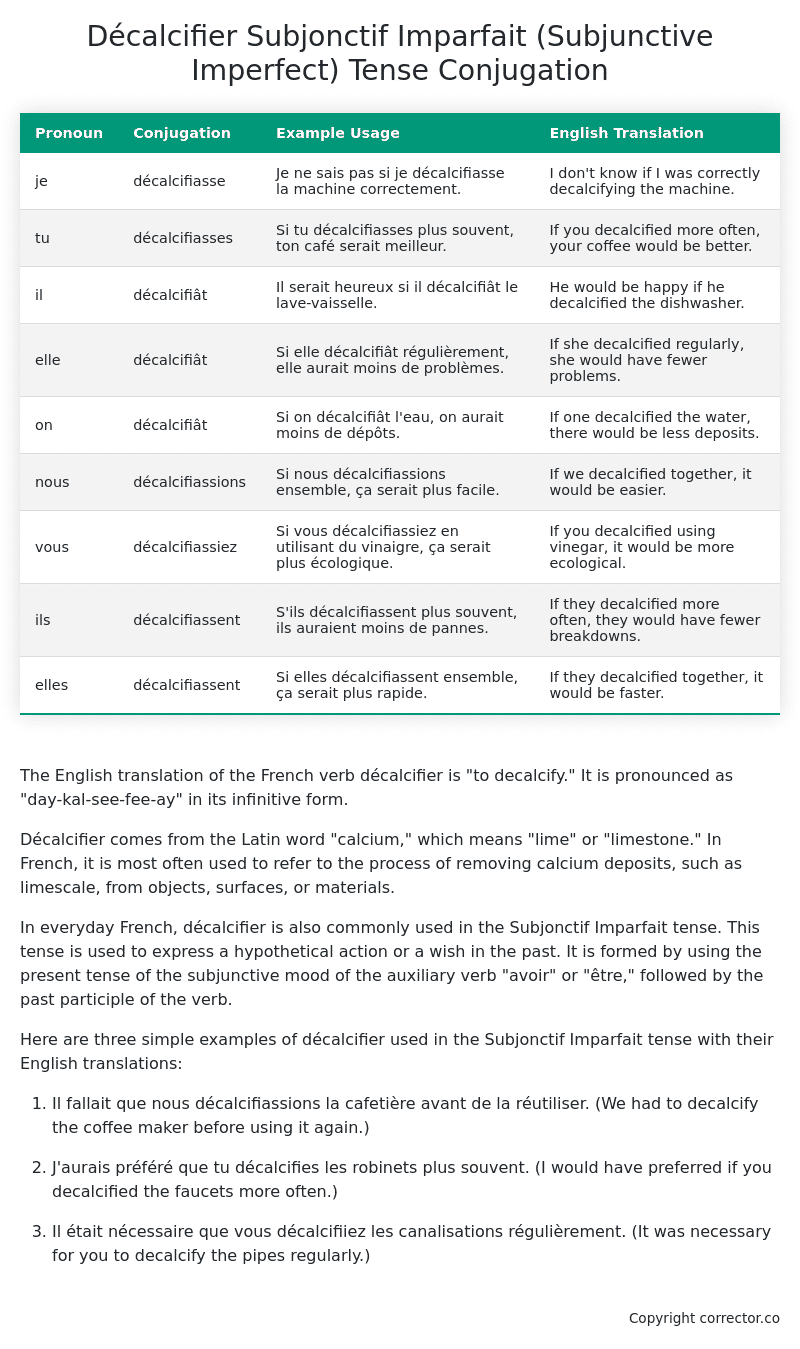Subjonctif Imparfait (Subjunctive Imperfect) Tense Conjugation of the French Verb décalcifier
Introduction to the verb décalcifier
The English translation of the French verb décalcifier is “to decalcify.” It is pronounced as “day-kal-see-fee-ay” in its infinitive form.
Décalcifier comes from the Latin word “calcium,” which means “lime” or “limestone.” In French, it is most often used to refer to the process of removing calcium deposits, such as limescale, from objects, surfaces, or materials.
In everyday French, décalcifier is also commonly used in the Subjonctif Imparfait tense. This tense is used to express a hypothetical action or a wish in the past. It is formed by using the present tense of the subjunctive mood of the auxiliary verb “avoir” or “être,” followed by the past participle of the verb.
Here are three simple examples of décalcifier used in the Subjonctif Imparfait tense with their English translations:
-
Il fallait que nous décalcifiassions la cafetière avant de la réutiliser.
(We had to decalcify the coffee maker before using it again.) -
J’aurais préféré que tu décalcifies les robinets plus souvent.
(I would have preferred if you decalcified the faucets more often.) -
Il était nécessaire que vous décalcifiiez les canalisations régulièrement.
(It was necessary for you to decalcify the pipes regularly.)
Table of the Subjonctif Imparfait (Subjunctive Imperfect) Tense Conjugation of décalcifier
| Pronoun | Conjugation | Example Usage | English Translation |
|---|---|---|---|
| je | décalcifiasse | Je ne sais pas si je décalcifiasse la machine correctement. | I don’t know if I was correctly decalcifying the machine. |
| tu | décalcifiasses | Si tu décalcifiasses plus souvent, ton café serait meilleur. | If you decalcified more often, your coffee would be better. |
| il | décalcifiât | Il serait heureux si il décalcifiât le lave-vaisselle. | He would be happy if he decalcified the dishwasher. |
| elle | décalcifiât | Si elle décalcifiât régulièrement, elle aurait moins de problèmes. | If she decalcified regularly, she would have fewer problems. |
| on | décalcifiât | Si on décalcifiât l’eau, on aurait moins de dépôts. | If one decalcified the water, there would be less deposits. |
| nous | décalcifiassions | Si nous décalcifiassions ensemble, ça serait plus facile. | If we decalcified together, it would be easier. |
| vous | décalcifiassiez | Si vous décalcifiassiez en utilisant du vinaigre, ça serait plus écologique. | If you decalcified using vinegar, it would be more ecological. |
| ils | décalcifiassent | S’ils décalcifiassent plus souvent, ils auraient moins de pannes. | If they decalcified more often, they would have fewer breakdowns. |
| elles | décalcifiassent | Si elles décalcifiassent ensemble, ça serait plus rapide. | If they decalcified together, it would be faster. |
Other Conjugations for Décalcifier.
Le Present (Present Tense) Conjugation of the French Verb décalcifier
Imparfait (Imperfect) Tense Conjugation of the French Verb décalcifier
Passé Simple (Simple Past) Tense Conjugation of the French Verb décalcifier
Passé Composé (Present Perfect) Tense Conjugation of the French Verb décalcifier
Futur Simple (Simple Future) Tense Conjugation of the French Verb décalcifier
Futur Proche (Near Future) Tense Conjugation of the French Verb décalcifier
Plus-que-parfait (Pluperfect) Tense Conjugation of the French Verb décalcifier
Passé Antérieur (Past Anterior) Tense Conjugation of the French Verb décalcifier
Futur Antérieur (Future Anterior) Tense Conjugation of the French Verb décalcifier
Subjonctif Présent (Subjunctive Present) Tense Conjugation of the French Verb décalcifier
Subjonctif Passé (Subjunctive Past) Tense Conjugation of the French Verb décalcifier
Subjonctif Imparfait (Subjunctive Imperfect) Tense Conjugation of the French Verb décalcifier (this article)
Conditionnel Présent (Conditional Present) Tense Conjugation of the French Verb décalcifier
Conditionnel Passé (Conditional Past) Tense Conjugation of the French Verb décalcifier
L’impératif Présent (Imperative Present) Tense Conjugation of the French Verb décalcifier
L’infinitif Présent (Infinitive Present) Tense Conjugation of the French Verb décalcifier
Struggling with French verbs or the language in general? Why not use our free French Grammar Checker – no registration required!
Get a FREE Download Study Sheet of this Conjugation 🔥
Simply right click the image below, click “save image” and get your free reference for the décalcifier Subjonctif Imparfait tense conjugation!

Décalcifier – About the French Subjonctif Imparfait (Subjunctive Imperfect) Tense
Formation
Common Everyday Usage Patterns
Interactions with Other Tenses
Subjonctif Présent
Indicatif Passé Composé
Conditional
Conditional Perfect
Summary
I hope you enjoyed this article on the verb décalcifier. Still in a learning mood? Check out another TOTALLY random French verb conjugation!


